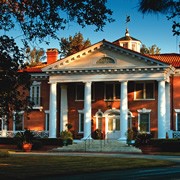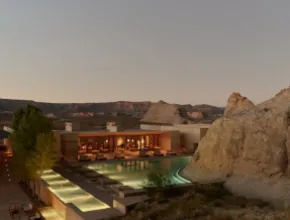High level executive meetings and retreats continue despite the state of the economy, albeit with less gilding and downtime, say planners and hotel managers around the U.S.
Small and large sites that specialize in hosting upscale corporate groups report that most executive programs are all business these days. At the same time, some organizations are relying less on third-party assistance to put an occasion over the top, a trend that is putting more pressure on hotel staff to provide guidance, especially to novice planners.
It’s also a sign of the times that perception from outsiders, particularly stockholders, regarding the content of an executive program is as important as what’s really taking place. Any appearance—some call it the AIG effect—that executive groups are having fun away from the office is getting scuttled in favor of program components demonstrating that meetings are all work and no play.
So how do planners with less money and a directive to curb the glitz achieve success now? As in most any crisis period, there’s both challenge and opportunity in the quest.
Objectives Rule
Bob Seidler, general manager for the 19-room The Woodlands Resort & Inn in Summerville, S.C., a restored historic estate near Charleston, says his property’s small size and secluded location on 40 acres outside the urban center are giving it a competitive edge in this economic climate against large luxury hotels operated by well-known chains.
Operating costs are lower than those of its center city counterparts, he says, and the setting gives high-level groups the privacy, service and concentration they require.
The Woodlands is also on top of the hospitality industry’s performance lists as one of only a handful of U.S. properties to have received five Mobil stars and five AAA diamonds for both its dining and lodging components. Yet it doesn’t inspire a perception of frivolity for today’s high-level gatherings.
“We have the great accolades, but the property doesn’t scream opulence and decadence like some of the large brand hotels,” Seidler says. “There’s not an immediate perception of ‘wow’ here.”
He adds that a unique service culture is what keeps the property on top of the ratings, which means staff can offer planners ideas and alternatives they may not think of on their own.
Like The Woodlands, The Inn at Montchanin Village outside Wilmington, Del., is near a major city yet offers a secluded setting, and that works to its advantage for planners who require a quiet atmosphere to accomplish objectives, along with stellar service.
“We were working on a new manager assimilation program, and our motive was to get people out of the office and locked up for three days,” says Linda Ontiveros, senior manager for training and organization development for InterDigital Communications in King of Prussia, Pa. “Montchanin was perfect for this because it offers an informal atmosphere for a very structured program.”
She adds that, unlike at a meeting held at a conference center, participants felt free to “wear jeans and let their guard down, even though they were away from work and in session from 9 a.m. to 10 p.m.”
Her group, which consisted of 25 people ranging from executive managers to lower-level employees, stayed on the property except for one team-building rafting exercise held at a state park.
Cassy Scrima, director of sales and marketing for Marcus Hotels and Resorts in Milwaukee, Wis., asserts that executive groups are bypassing resorts in favor of downtown properties such as Milwaukee’s The Pfister Hotel, which is perceived as more conducive to an all-business agenda.
“Though we do have a spa on-site and multiple restaurants for private dining events, we see the high-level groups going for downtown hotels because they want to concentrate on the nuts and bolts of business,” she says. “If they want a breather, we organize Wii game breaks or something similar.”
Help from Hotels
Some budget-minded planners who previously may have hired third-party companies to do their executive meetings and events are now relying instead on hotel staffs to carry much of the planning and implementation load, according to Yasmin Haufschild, director of special events at the Fairmont Chateau Whistler in Whistler, British Columbia. She says she remains part of her hotel’s convention services department, but has a new expanded role.
“Many planners of events for high-level people and others aren’t going to third parties now but directly to the hotel,” Haufschild says. “It’s likely organizations now have less budget for doing such occasions, and they are looking for one-stop shopping. They ask us to book their linen, entertainment, local transportation and other needs.
“The hotel does charge a little for that labor, but planners find it’s more cost effective to have us carry these tasks, especially because we know the ins and outs of the marketplace. They know we have the scoop on local suppliers and can get the best deals because of our relationships.”
Because of organization downsizing and increased responsibilities for remaining employees, many who now plan high-level meetings are novices in the arena, a situation which Hausfschild says brings new difficulties for hotels.
“Many organizations have fewer people in their departments, and the ones who are still there have less time,” she says. “This often means I am dealing with people who are not decision-makers and this makes my job more challenging. We ask a million questions and do a lot of hand-holding. But we are willing to do this because this is a year like no other.”
Andrew Braune, director of sales for The Inn at Montchanin Village, agrees with Haufschild. The labor load for properties that host high-level meetings is greater than ever these days, because people are trying to use available time and money to best advantage.
“We typically function like a concierge,” Braune says. “We strive to personalize groups’ stays here, and we work closely with the many attractions we have here in the Brandywine Valley to accomplish whatever objectives they have.”
According to Braune, executive groups often require a more hands-on approach, primarily because expectations tend to be higher in any economic climate.
“Some have intense programs and others are more laid-back, and we want to customize their experiences as much as possible,” he says. “For example, we have relationships with local private golf courses if they want tee times, and, of course, we work with all our great DuPont properties, like Longwood Gardens, Nemours and Winterthur to deliver special experiences.”
Planner’s Role
During this economic malaise, property managers say planners are looking for lots of value-adds when they book their groups, often on short notice. Hoteliers are ready to deliver what they can to snare business, but many greatly prefer a partnership approach to ensure success.
While both planners and suppliers may want to maintain certain standards for executive events, there is the need for a sort of “we are in this together” attitude. Also, most hotel managers say planners who know their objectives for high-level events and who are familiar with the property and surrounding destination play a crucial role in achieving event success.
“Communication is so important, and the more information we have prior to arrival, the better we can serve our clients,” Braune says. “We want to be sure we’ve dotted all the i’s and crossed all the t’s before they arrive on property, and this means planners need to be forthcoming with their expectations and objectives. Is this event business-intense or more laid back? The answer can help me theme food, for instance. The more I can learn from my client beforehand, the better I can do things just as they want.”
Scrima says that like many other hotels, her Milwaukee properties—the Pfister, Hilton Milwaukee City Center and the InterContinental Milwaukee—are flexible with contracts and will consider most any value-add component within reason.
“We are all fighting in this economy,” she says, “so we are willing to be creative with contracts. We just ask planners to be open-minded and see things from our side with things they are asking us to do. We will do what we can to make their event happen.”
Seidler likes to work with planners who are looking for unique group experiences, people who are willing to do something on the cutting edge, such as extraordinary dining.
“We like planners who are adventuresome, who are not rooted in tradition,” he says. “When someone is open to new ideas and ways to achieve objectives, we pride ourselves in delivery of unique solutions anytime.”






